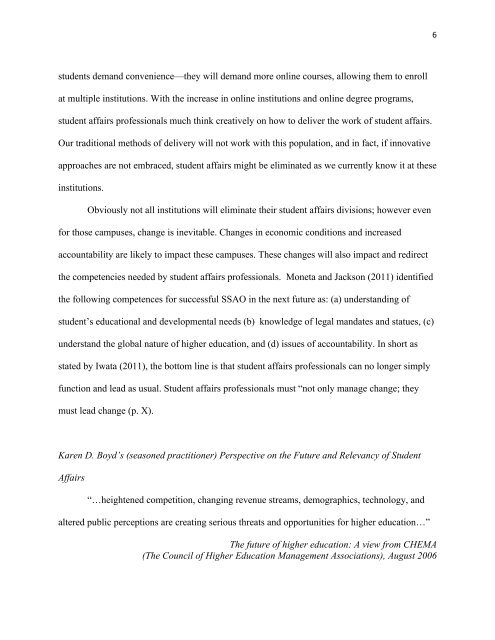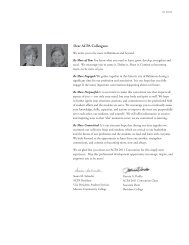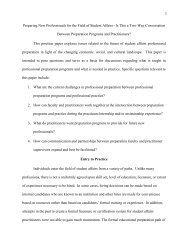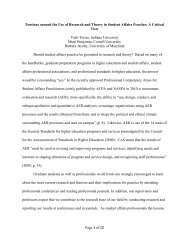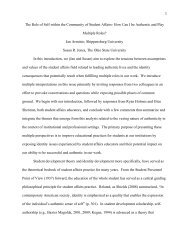Is Student Affairs Relevant for the 21st Century? Tony W. Cawthon ...
Is Student Affairs Relevant for the 21st Century? Tony W. Cawthon ...
Is Student Affairs Relevant for the 21st Century? Tony W. Cawthon ...
Create successful ePaper yourself
Turn your PDF publications into a flip-book with our unique Google optimized e-Paper software.
students demand convenience—<strong>the</strong>y will demand more online courses, allowing <strong>the</strong>m to enroll<br />
at multiple institutions. With <strong>the</strong> increase in online institutions and online degree programs,<br />
student affairs professionals much think creatively on how to deliver <strong>the</strong> work of student affairs.<br />
Our traditional methods of delivery will not work with this population, and in fact, if innovative<br />
approaches are not embraced, student affairs might be eliminated as we currently know it at <strong>the</strong>se<br />
institutions.<br />
Obviously not all institutions will eliminate <strong>the</strong>ir student affairs divisions; however even<br />
<strong>for</strong> those campuses, change is inevitable. Changes in economic conditions and increased<br />
accountability are likely to impact <strong>the</strong>se campuses. These changes will also impact and redirect<br />
<strong>the</strong> competencies needed by student affairs professionals. Moneta and Jackson (2011) identified<br />
<strong>the</strong> following competences <strong>for</strong> successful SSAO in <strong>the</strong> next future as: (a) understanding of<br />
student’s educational and developmental needs (b) knowledge of legal mandates and statues, (c)<br />
understand <strong>the</strong> global nature of higher education, and (d) issues of accountability. In short as<br />
stated by Iwata (2011), <strong>the</strong> bottom line is that student affairs professionals can no longer simply<br />
function and lead as usual. <strong>Student</strong> affairs professionals must “not only manage change; <strong>the</strong>y<br />
must lead change (p. X).<br />
Karen D. Boyd’s (seasoned practitioner) Perspective on <strong>the</strong> Future and Relevancy of <strong>Student</strong><br />
<strong>Affairs</strong><br />
“…heightened competition, changing revenue streams, demographics, technology, and<br />
altered public perceptions are creating serious threats and opportunities <strong>for</strong> higher education…”<br />
The future of higher education: A view from CHEMA<br />
(The Council of Higher Education Management Associations), August 2006<br />
6


